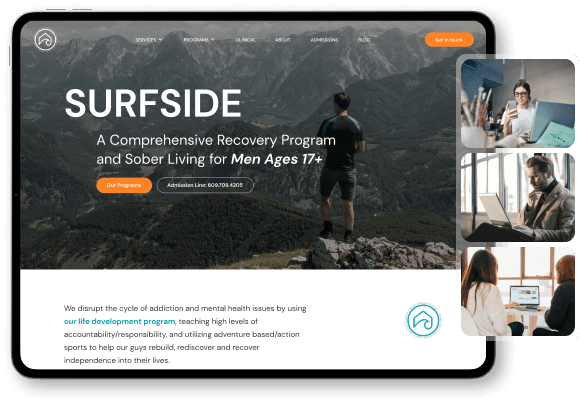blog
Boosting Engagement on Mental Health Websites with Interactive Features
Aug 6, 2024
In the competitive digital landscape, mental health websites need to provide a welcoming, engaging experience to attract and retain visitors. Interactive features like self-assessment quizzes, symptom checkers, and virtual chat tools offer a unique way to engage users, improve their experience, and encourage them to reach out for support. These interactive elements not only enhance user experience but also help build trust, drive conversions, and foster long-term client relationships.
In this article, we’ll explore why interactive features are valuable for mental health websites and discuss the benefits of self-assessment quizzes, symptom checkers, and virtual chat to keep visitors engaged and support their mental health journey.
Why Interactive Features Matter for Mental Health Websites
Interactive features provide a unique opportunity for mental health websites to build rapport with visitors and establish a welcoming atmosphere. These features go beyond standard website content, offering tools that encourage visitors to engage actively with the information on the site.
Benefits of adding interactive features to mental health websites include:
Increasing Visitor Engagement: Interactive elements encourage visitors to spend more time on the website, which can help reduce bounce rates and improve SEO rankings.
Building Trust and Connection: By providing tools that help visitors understand their mental health better, you establish your website as a valuable, trustworthy resource.
Guiding Visitors to Seek Support: Interactive features can serve as a bridge between the website and booking a session, making it easier for visitors to reach out for professional help.
Providing Personalized Information: Interactive tools, such as quizzes and symptom checkers, allow visitors to access information tailored to their specific needs, creating a more personalized and helpful experience.
1. Self-Assessment Quizzes: Engaging Visitors with Insightful Tools
Self-assessment quizzes are a popular feature on mental health websites, allowing users to evaluate their own mental health and gain insights into their feelings, stress levels, or potential symptoms. These quizzes are not diagnostic tools but provide valuable information that can encourage users to consider seeking further help.
Benefits of Self-Assessment Quizzes:
Encourages Self-Reflection: Self-assessment quizzes provide visitors with an opportunity to reflect on their mental health, potentially identifying areas where they could benefit from professional support.
Increases Engagement: Quizzes are inherently engaging; they keep visitors on the page longer and increase their interest in exploring other resources on the website.
Offers Non-Intimidating Support: Self-assessment quizzes give visitors a private, non-judgmental space to explore their concerns without feeling pressured to take immediate action.
Encourages Conversion: When paired with calls-to-action (CTAs), self-assessment quizzes can lead visitors to schedule a consultation or sign up for a newsletter, building a stronger connection with potential clients.
Examples of Effective Self-Assessment Quizzes:
Stress Level Quiz: This type of quiz helps users gauge their current stress levels and provides suggestions on how they might manage it.
Anxiety or Depression Screening: A simple screening quiz can help users recognize symptoms of anxiety or depression and may encourage them to seek further assessment.
Burnout Assessment: Particularly useful for clients who may be feeling exhausted or overwhelmed by work or personal responsibilities, a burnout assessment can offer insight into how stress may be impacting their well-being.
2. Symptom Checkers: Guiding Visitors in Understanding Mental Health
Symptom checkers are another effective way to engage visitors by allowing them to explore symptoms they may be experiencing. These tools provide information about various mental health conditions, helping users gain a better understanding of what they might be dealing with.
Benefits of Symptom Checkers:
Increases Awareness: Symptom checkers educate visitors about different mental health conditions, helping them gain insights into their symptoms and possible underlying issues.
Promotes Early Intervention: By helping users recognize potential signs of mental health conditions, symptom checkers can encourage individuals to seek help early, leading to better outcomes.
Enhances User Experience: Symptom checkers provide tailored information based on users’ input, creating a personalized experience that makes them feel understood and supported.
Builds Trust with Potential Clients: By providing accurate, reliable information, symptom checkers reinforce the credibility of your mental health practice, making users more likely to trust your services.
Examples of Symptom Checkers for Mental Health Websites:
Mood Disorder Checker: This tool allows users to explore symptoms related to mood disorders, such as bipolar disorder or depression, helping them understand when it might be time to reach out.
Anxiety Symptoms Checker: This interactive feature can help users identify common symptoms of anxiety and may motivate them to seek therapy or counseling.
Sleep Issues Checker: Since sleep problems are often connected to mental health, a sleep symptoms checker can be helpful for visitors experiencing insomnia or other sleep-related issues.
3. Virtual Chat: Providing Real-Time Connection and Support
Virtual chat tools, such as live chat and chatbots, are excellent ways to offer real-time assistance to website visitors. These tools can answer questions, provide guidance, and even help visitors book appointments, making it easier for users to take the next step.
Benefits of Virtual Chat for Mental Health Websites:
Immediate Assistance: Virtual chat tools can provide users with immediate answers to common questions, helping them feel supported and cared for.
Increases Engagement and Retention: Live chat tools encourage users to stay on the website longer and can prevent users from leaving if they can’t find the information they need right away.
Encourages Booking: By providing a direct path to schedule appointments, chat tools can increase conversion rates and help prospective clients take action toward receiving support.
Personalized Support Options: Live chat or chatbots can be programmed to provide specific resources based on the user’s responses, allowing for a tailored experience.
Types of Virtual Chat Tools for Mental Health Websites:
Live Chat: Offering live chat with a trained representative or receptionist allows users to get answers to questions about services, appointment availability, and more.
AI-Powered Chatbots: Chatbots can provide quick answers to frequently asked questions, direct visitors to specific pages, or provide a gentle nudge toward booking a consultation.
Crisis Chat Support: For websites that offer more direct mental health support, a crisis chat feature (staffed by professionals) can help users who may be experiencing a mental health emergency.
Best Practices for Implementing Interactive Features on Mental Health Websites
Implementing interactive features requires careful planning to ensure they’re user-friendly, helpful, and respectful of visitors’ needs. Here are some tips to maximize the effectiveness of these tools:
Prioritize User Privacy: When implementing features like symptom checkers and self-assessment quizzes, prioritize user privacy. Use secure forms, clearly state data privacy policies, and remind users that these tools are not substitutes for professional diagnoses.
Keep the Tone Supportive and Non-Judgmental: Ensure that your content, especially self-assessments and symptom checkers, uses a supportive and empathetic tone. Mental health websites should aim to create a judgment-free zone where users feel safe and understood.
Include Calls-to-Action: Integrate CTAs within quizzes, symptom checkers, and chat tools, encouraging visitors to take the next step. Phrases like “Consider Scheduling a Consultation” or “Learn More About Our Services” can be effective.
Use Clear, Easy-to-Understand Language: Avoid jargon or complex language in quizzes and symptom checkers. Instead, use straightforward language to make these tools accessible to all users.
Test for Accessibility: Make sure interactive tools are accessible to individuals with disabilities. Use features such as keyboard navigation, screen reader compatibility, and clear text for those with visual or cognitive challenges.
Regularly Update Content: Ensure that symptom checkers, quiz content, and chat scripts are regularly reviewed to stay up-to-date with the latest mental health information, creating a reliable experience for users.
Final Thoughts: Creating an Engaging, Supportive Experience on Mental Health Websites
Incorporating interactive features like self-assessment quizzes, symptom checkers, and virtual chat can significantly enhance the user experience on mental health websites. These tools not only provide valuable information but also create a more engaging, personalized experience that helps clients feel supported and understood. By offering visitors a way to interact with your site, you’re building trust and providing an environment that encourages them to take the next step in their mental health journey.
Interactive features are powerful tools that not only improve engagement but also help position your mental health practice as a trusted and accessible resource. With thoughtful planning and a client-centered approach, these tools can make a significant difference in your online presence, helping to connect with more individuals in need of mental health support.
Do you find this article useful?
We create beautiful websites for mental health businesses that will help families and people in need to make the right choice. Let us help you improving your website, we got the experience and the passion to convert visitors into customers.
Prev
Next



